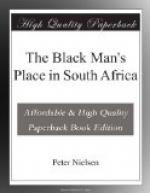It is true that certain prominent Natives of the educated class have protested strongly against this policy, but it is not true that these men have spoken on behalf of the Natives as a whole; indeed, it is safe to say that the vast bulk of the Natives of South Africa have even now no clear knowledge of the legislation that has been made recently in the pursuance of this policy. The protests that have been made from the Native side, moreover, have been directed against the hardship caused through harshness in carrying out the Act in certain places, and against the relative smallness of the areas proposed for Native occupation, and not against the principle itself, and there can be no doubt that the statement quoted from the Report of the Native Lands Commission conveys the true feeling of the large majority of the Natives.
These are some of the objections that have been raised to the policy of territorial separation, but the gravest danger to the successful working of that policy remains to be mentioned. It is the possibility that the cupidity of the whites may lead them to remove their black neighbour’s landmarks in the event of the discovery of new fields of gold or other valuable minerals within the Native areas. The danger of such a lapse from the righteousness that exalteth a nation can only be averted by the constant exercise of the public conscience of the whites themselves.
No reasonable person will expect that this policy will do away entirely with all the little troubles that arise from the clashing of opposite racial interests. In the white areas the Native, who can come there only as a labourer or visitor, not as a settler, will remain subordinate to the whites, but his unavoidable competition in trade and industry may nevertheless lead to friction now and then, and the continuance of the present pin-prick policy of enforcing humiliating pass-laws and similar racial restrictions will certainly lead to trouble. But if tolerance and honesty prevail in our councils we shall be able to adjust and settle the many questions that are bound to arise from time to time through the juxtaposition in the industrial field of the two immiscible elements.
But I must come to an end. I have tried to show that there is good reason for accepting the Bantu as the equals of Europeans in every respect save past achievement, but that because of unalterable physical disparity, and not because of any mental inequality, the whites and the blacks cannot live in peace and good-will together in one place, wherefore it follows, as a necessary conclusion, that territorial separation is the only way to lasting peace and happiness in South Africa. I say, therefore, that the black man’s place in his own country must be assigned not below, nor above, but apart from that of the white man, for that which nature has made separate man may not join together. I have endeavoured also to show that there is good reason for believing the Bantu to be no less capable of adopting and adapting Western civilisation than other races which in the past have risen from rude barbarism to high culture, but here I admit that the full proof of my belief must be given by the Natives themselves.




